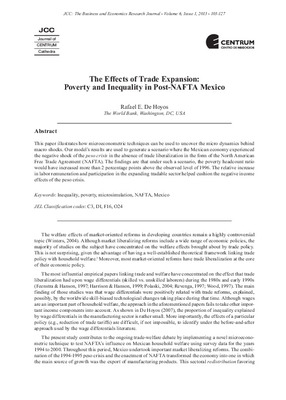| dc.contributor.author | Navarro, De Hoyos | |
| dc.contributor.author | E, Rafael | |
| dc.date.accessioned | 2023-07-21T19:18:19Z | |
| dc.date.available | 2023-07-21T19:18:19Z | |
| dc.date.issued | 2013 | |
| dc.identifier.uri | https://repositorio.pucp.edu.pe/index/handle/123456789/194819 | |
| dc.description.abstract | This paper illustrates how microeconometric techniques can be used to uncover the micro dynamics behind macro shocks. Our model’s results are used to generate a scenario where the Mexican economy experienced the negative shock of the peso crisis in the absence of trade liberalization in the form of the North American Free Trade Agreement (NAFTA). The findings are that under such a scenario, the poverty headcount ratio would have increased more than 2 percentage points above the observed level of 1996. The relative increase in labor remuneration and participation in the expanding tradable sector helped cushion the negative income effects of the peso crisis. | en_US |
| dc.language.iso | eng | |
| dc.publisher | Pontificia Universidad Católica del Perú. CENTRUM | es_ES |
| dc.relation.ispartof | urn:issn:1851-6599 | |
| dc.rights | info:eu-repo/semantics/openAccess | es_ES |
| dc.rights.uri | http://creativecommons.org/licenses/by/4.0 | * |
| dc.source | Journal of CENTRUM Cathedra, Vol. 6, Issue 1 | |
| dc.subject | Inequality | en_US |
| dc.subject | Mexico | en_US |
| dc.subject | NAFTA | en_US |
| dc.subject | Microsimulation | en_US |
| dc.subject | Poverty | en_US |
| dc.title | The Effects of Trade Expansion: Poverty and Inequality in Post-NAFTA Mexico | en_US |
| dc.type | info:eu-repo/semantics/article | |
| dc.type.other | Artículo | |
| dc.subject.ocde | https://purl.org/pe-repo/ocde/ford#5.02.04 | |
| dc.publisher.country | PE | |


